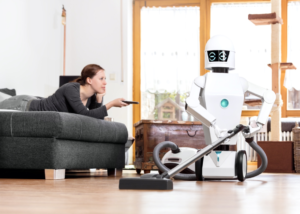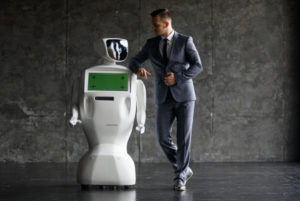Almost 22 million jobs have been lost in the United States as a result of the Covid-19 pandemic, as many businesses were forced to lay off or furlough employees during the crisis. According to the Bureaus of Labor Statistics, only 42 percent of the jobs that were lost have been regained so far and it is being predicted that jobs won’t be fully replaced until 2024. The Hotel Industry was especially impacted by travel restrictions and mandatory stay at home orders that resulted in low occupancy levels that left most hotels on the brink of permanently closing. Hotels began investing heavily in automated and robotic hotel technology in order to keep their businesses open and to provide guests and employees with a safe environment.
Upgrade Your Hotel Technology!
Why Are Robotics and Automated Hotel Technology Appealing?
Automated technology was already available and would have made its way into the Hotel Industry in the future but was accelerated by Covid-19 and the need for hotels to prevent infections. Hotels sought out technology in an attempt to limit contact while still catering to guests. Robots and Automated technology can be used for a number of jobs within hotels, including jobs that are considered dangerous and that may expose employees to the coronavirus or to hazardous chemicals. Automation increases productivity, while cutting the high turnover rates normally associated with the Hotel Industry. Businesses can also expect to see an increase in productivity, a lowering of labor costs and will provide a solution to the labor shortage of unskilled workers.
Types of Robotics and Automated Technology
As a response to Covid-19, hotels began investing heavily in hotel technology that was automated and allowed for very little interaction between hotel employees and guests. Guests have the option to check in digitally using their mobile phones with mobile check-in or to check in at kiosks at the hotel, therefore eliminating the need for any interaction with front desk staff. Some hotels offer guests smart rooms that can digitally control the entertainment, that can control the temperature and that can be used to order room service. Smart rooms also allow guests to sync streaming services like Amazon to the televisions in their hotel rooms. Robots are also being used in place of the concierge and are able to provide guests with information regarding local attractions and any hotel information that may be needed. Sanitation robots use cleaning technology to clean guest rooms and public areas and have the ability to work around the clock. Delivery robots are also being used in room service to deliver meals, towels and any number of items that guests request. These robots have the ability to take the elevator and can make over 100 deliveries daily. Guests can unlock the robots with a unique code from their mobile phones in order to retrieve their delivery. These technologies are contactless and do not require employees in order to carry out their daily functions.
Hotel Robots Are Nothing New
In 2015 Japan opened its Henn Na Hotel which consisted of 243 robots, robots were used primarily throughout many of the areas of the hotel. But by 2019 the hotel had figured out which robots were effective, and which needed to be replaced and reduced their robotic staff by 50 percent and returned to a more traditional type of hotel service. In 2019 Alibaba’s FlyZoo Hotel in China opened its 290-room hotel that is almost entirely ran by robots and most functions within the hotel is automated. From check in to check out, most of the services offered by the hotel is provided by robots. Robots deliver food, towels and toiletries and many other items that guests may request. Guests make reservations and payments from their mobile phones; they have the ability to check in using kiosks in the hotel and can enter their rooms using facial recognition.
The Robot Revolution
According to the World Economic Forum, by 2025 employers will be dividing work between humans and machines. Most jobs that will become automated will be information and data processing, administrative and routine manual jobs. Automation is predicted to replace 85 million jobs within the next five years and the effect will be felt globally by medium and large sized companies. More than 80 percent of businesses surveyed anticipated accelerating plans to digitize work processes with new technology and 50 percent predicted that automation of some roles would be fast tracked. 43 percent of businesses surveyed indicated that they planned to reduce their workforce due to technology integration, but 34 percent planned to expand their workforce as a result of new technology.
What Does This Mean for Hotel Employees?
Job loss within the industry will be a reality, as new hotel technology will cut costs while providing more efficient service. The longer the pandemic continues, the more the possibility increases that some jobs that became automated as a response to Covid-19 will become permanent. In the past, automation has eliminated jobs but lead to the growth of new jobs to accommodate the increase in work that automation created. Companies that turned to technology saw a 4 percent increase in productivity despite the absence of employees. Automation will mostly affect unskilled workers and some hotel employees will need to be upskilled in an effort to fill roles that require more competences. While the robot revolution might lead to a decrease in jobs, 97 million jobs are expected to be created as a result of the workplace becoming more automated.
What Does the Future Hold?
The Hotel Industry welcomes guests from all over the world and ensures that they have a great guest experience. In the near future robots and employees will coexist in the workplace, but the personal touch that employees bring to their roles in hospitality can never be replaced by machines.





